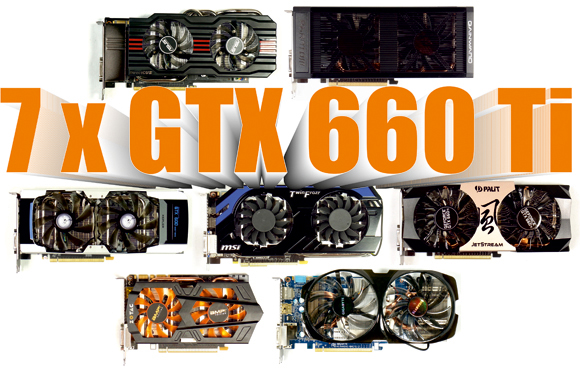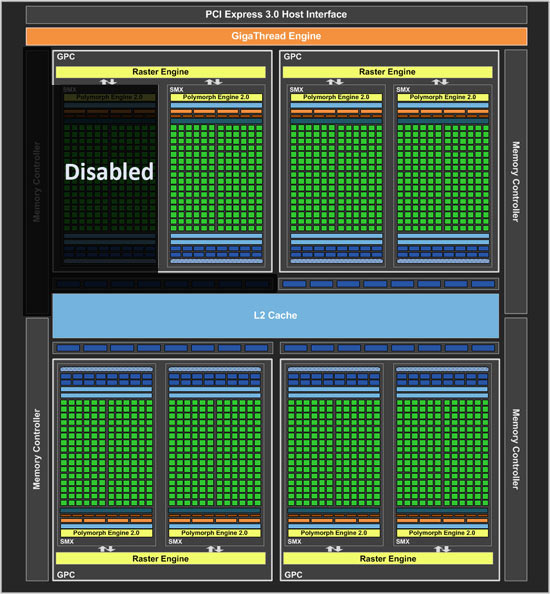Seven GeForce GTX 660 Ti Cards: Exploring Memory Bandwidth
Seven GeForce GTX 660 Tis landed in our lab. Today, we're benchmarking them, measuring their noise and temperatures, and conducting a more in-depth analysis of the impact a 192-bit memory interface has on performance. The results are enlightening!
Seven GeForce GTX 660 Tis, Rounded-Up
Even though Nvidia's GeForce GTX 660 Ti hasn’t been around for long, there are almost as many third-party board designs as the much more mature GeForce GTX 670. Of course, this isn't particularly surprising; there is no real GTX 660 Ti reference design, compelling vendors to create their own product.
We covered the card's technical specifications in GeForce GTX 660 Ti Review: Nvidia's Trickle-Down Keplernomics. So, today, we're focusing on those retail cards with aftermarket tweaks and optimizations. We have a total of seven submissions from Asus, Gainward, Gigabyte, Galaxy, MSI, Palit, and Zotac. EVGA wasn’t able to send us a sample this time around, and we never heard back from Point of View (which is fine, since they don't sell in the U.S. anyway).
When we finished up with our benchmarks, we discovered that different tests led us to divergent conclusions about the cards we tested. The game and settings you use can have a huge impact on the performance of Nvidia's GeForce GTX 660 Ti. This was perhaps most evident in our launch story, which many of you pointed out didn't always jive with some of the other reviews out there. And yet, we picked the settings for each test we ran based on what the GeForce GTX 660 Ti could handle, yielding both playable performance and optimal graphics quality. That's what any gamer is going to do.
So, what caused the discrepancy? We're including an in-depth memory bandwidth analysis, which should really spell out why our results came out the way they did, and why we think they're right on the money. We're also taking a good look at the usable GPU Boost clock rates for these cards. After all, you never know what you’ll find when you dig deep enough!
Technical Specifications
As you already know, Nvidia's GeForce GTX 660 Ti uses the same GK104 silicon as its GeForce GTX 670. The new card's memory interface is cut back from 256 to 192 bits, though. Also, one of its four render back-end clusters is disabled. The GPUs are otherwise completely identical, including seven SMX blocks with a total of 1344 CUDA cores and 112 texture units.
Each of the remaining ROP clusters can output up to eight 32-bit pixels, for a total of 24 pixels per clock. The three 64-bit memory interfaces provide the aggregate 192-bit pathway. And coincidentally, the GPU and memory clock rates are the same as GeForce GTX 670. Then again, that fact doesn't really apply to today's story; six of the seven cards are overclocked right from the factory.
Get Tom's Hardware's best news and in-depth reviews, straight to your inbox.
Let’s first have a look at the seven cards’ technical specifications.
| Header Cell - Column 0 | Asus GTX 660Ti DirectCU II | Gainward GTX 660 Ti Phantom | Gigabyte GeForce GTX 660 Ti Windforce 2x OC Edition | Galaxy GeForce GTX 660 Ti GC 3 GB | MSI N660 Ti PE 2GD5/OC | Palit GTX 660 Ti Jetstream | Zotac GeForce GTX 660 Ti AMP! Edition |
|---|---|---|---|---|---|---|---|
| Shaders | 1344 | ||||||
| Texture Units | 112 | ||||||
| ROPs | 24 | ||||||
| GPU Clock | 915 MHz | 1006 MHz | 1032 MHz | 1006 MHz | 1019 MHz | 1006 MHz | 1033 MHz |
| Boost Clock | 980 MHz | 1085 MHz | 1111 MHz | 1084 MHz | 1088 MHz | 1085 MHz | 1111 MHz |
| Pixel Fill Rate | 22.0 GPix/s | 24.1 GPix/s | 24.8 GPix/s | 24.1 GPix/s | 24.5 GPix/s | 24.1 GPix/s | 24.8 GPix/s |
| Texture Fill Rate | 102.5 GTex/s | 112.7 GTex/s | 115.7 GTex/s | 112.7 GTex/s | 114.2 GTex/s | 112.7 GTex/s | 115.7 GTex/s |
| Memory Clock | 1502 MHz | 1527 MHz | 1502 MHz | 1502 MHz | 1502 MHz | 1527 MHz | 1652 MHz |
| Memory Interface | 192-bit | ||||||
| Bandwidth | 144.2 GB/s | 146.6 GB/s | 144.2 GB/s | 144.2 GB/s | 144.2 GB/s | 146.6 GB/s | 158.6 GB/s |
| Memory | 2 GB GDDR5 | 3 GB GDDR5 | 2 GB GDDR5 | ||||
| Die Size | 294 mm² | ||||||
| Transistors | 3.54 Billion | ||||||
| Power Connectors | 2 x 6-pin | ||||||
| Street Price | $300 | Row 14 - Cell 2 | $300 | $340 | $310 | Row 14 - Cell 6 | $310 |
On paper, Gigabyte and Zotac appear to have the most attractive boards, the former offering overclocked specifications right at Nvidia's MSRP, and the latter juicing memory performance, which we suspect will play a big role in alleviating bandwidth limitations, for just $10 more.
Two of the cards, from Gainward and Palit, aren't available to our U.S. audience right now. So, we don't have prices listed for them.
Current page: Seven GeForce GTX 660 Tis, Rounded-Up
Next Page Asus GTX 660Ti DirectCU II
Igor Wallossek wrote a wide variety of hardware articles for Tom's Hardware, with a strong focus on technical analysis and in-depth reviews. His contributions have spanned a broad spectrum of PC components, including GPUs, CPUs, workstations, and PC builds. His insightful articles provide readers with detailed knowledge to make informed decisions in the ever-evolving tech landscape
-
scotthulbs I'd Like to know which 2GB model 660ti you used in this comparison? I would like to see how if perhaps the Zotac memory overclock has much of an effect on performance. If you used the Zotac in this comparison that may very well be the reason it outperforms the 3GB Galaxy card? Maybe run this same test overclocking the memory, it seems as though the 660ti with its memory overclocked can nearly reach GTX670 Bandwidth. I'd like to see how much that helps overcome the narrow bus.Reply -
mayankleoboy1 The problem with wider memory interface is that it exponentially increases the chip's die-size. Hence, cost per wafer and power consumption will increase a lot.Reply
IMO both AMD and Nvidia should use the XDR2 memory in the next series of cards. That would give the same bandwidth at half the interface size. -
iknowhowtofixitThis review reinforces what I have been saying for weeks. The GTX 660Ti is overpriced at $300. Since you can easily find a HD7950 for $300 or less after rebates, it makes the 660TI irrelevant. To me, the 660Ti needs to be $60-$75 cheaper before it can achieve bang for the buck status.it is because of the 660ti that the 7950 prices dropped to $300 or less with MIR: so tell me how irrelevant they are now?Reply
-
ahrensy For the Batman Arkham City tests on the 670 and 660ti, was the PhysX setting set to Off, Low or High?Reply -
EzioAs Reply9537131 said:it is because of the 660ti that the 7950 prices dropped to $300 or less with MIR: so tell me how irrelevant they are now?
The 7950 has been our for months now compared to the 660ti and the price drop happens before the release of the 660ti. Nvidia should really have predicted that the 7950 prices should come down even more so it makes almost no sense that they release the 660ti at $300.
The 7870 performs just slightly slower compared to the 660ti but beats it once you crank up the AA really high and it costs $50 less. On the other hand the 7950 is overall faster than the 660ti and even surpass the the $60+ 670 once you crank the AA really high as well. For the 660ti to sell, Nvidia should really lower it to $260 imo.....or they could just rely on fanboys -
Reply9537133 said:The 7950 has been our for months now compared to the 660ti and the price drop happens before the release of the 660ti.
AMD cuts HD 7000 series price even furtherTuesday, 21 August 2012 08:57 (after the 660ti release)
AMD has already dropped the HD 7970 from US $479 to US $429, HD 7950 from US $399 to US $349 and the HD 7870 down from US $349 to US $299. The new price cut skips the HD 7970 graphics card but includes the HD 7950, HD 7870 as well as the 1 and 2GB versions of the HD 7850.
The most important is probably the price cut for the 3GB HD 7950 which battles it out with Nvidia's recently released GTX 660 Ti. The HD 7950 3GB is, according to the report, will receive a US $30 price cut placing it at US $320. The HD 7870 2GB graphics card got another US $50 price cut pushing it down to US $250 which probably makes it one of the most interesting mid-range graphics cards on the market.
cheers! :) -
FormatC Reply
PhysX was off, because it affects the overall performance. PhysX is dead - ok, not quite, but almost ;)9537132 said:For the Batman Arkham City tests on the 670 and 660ti, was the PhysX setting set to Off, Low or High?
-
EzioAs Reply9537134 said:AMD cuts HD 7000 series price even furtherTuesday, 21 August 2012 08:57 (after the 660ti release)
AMD has already dropped the HD 7970 from US $479 to US $429, HD 7950 from US $399 to US $349 and the HD 7870 down from US $349 to US $299. The new price cut skips the HD 7970 graphics card but includes the HD 7950, HD 7870 as well as the 1 and 2GB versions of the HD 7850.
The most important is probably the price cut for the 3GB HD 7950 which battles it out with Nvidia's recently released GTX 660 Ti. The HD 7950 3GB is, according to the report, will receive a US $30 price cut placing it at US $320. The HD 7870 2GB graphics card got another US $50 price cut pushing it down to US $250 which probably makes it one of the most interesting mid-range graphics cards on the market.
cheers! :)
If you check the price of the 7950s before this news at most online retailer (Newegg, NCIX), you'll know that the price drop happens already although the official news from AMD was a couple of weeks later -
Reply
now you are talking complete nonsense unless you do not understand there were two price drops and the latter of which is because of the 660ti; as the article stated.so you want to see pricing history . . :)9537136 said:If you check the price of the 7950s before this news at most online retailer (Newegg, NCIX), you'll know that the price drop happens already although the official news from AMD was a couple of weeks later
Sapphire Radeon HD 7950 3GB Video Card
now how much sense does it make to drop prices and not tell anyone?
:pfff:

